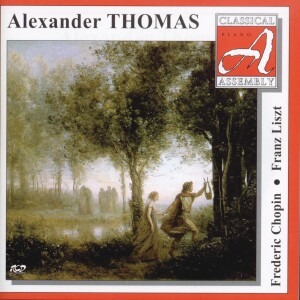|
|
World music CD DVD shop and Classic distribution
|
|
|
|
| CHOPIN, Frédéric François (1810-1849) | | | 1. | Nocturne Op. 15 No. 1 in F major | 1:39 | | | 2. | Nocturne Op. 15 No. 2 in F- sharp major | 2:54 | | | 3. | Nocturne Op. 27 in C sharp minor | 4:35 | | | 4. | Nocturne Op. 62 No. 2 in E major | 5:02 | | | 5. | Ballade No. 3 Op. 47 in A - flat major | 6:28 | | | 6. | Scherzo No. 1 Op. 20 in B minor | 9:24 | | | LISZT, Franz (1811-1886) | | | 7. | Sposalizio ("Années de Pèlerinage“, Deuxième Année: Italie) | 7:20 | | | 8. | Il Pensieroso ("Années de Pèlerinage“, Deuxième Année: Italie) | 4:05 | | | 9. | Les jeux d‘ eau A‘ la Villa D‘ Este ("Années de Pèlerinage“, Troisième Année) | 6:40 | | | 10. | Nuages Gris | 2:47 | | | 11. | Rhapsodie Hongroise No. 12 | 8:58 | | | 12. | Nocturne No. 3 "Liebesträume" | 4:24 | | Alexander Thomas, born in Kalinin, is now in his early forties. He studied at the Central Special Music School in Moscow. Central to his development were figures such as Lev Vlasenko - a rival to Van Cliburn once upon a time in Moscow - and Grigory Sokolov; the former as a teacher in Moscow, the latter at the Rimsky-Korsakov conservatory in St Petersburg. After a number of competition successes he became the principal soloist of the Moskoncert Moscow State Philharmonic Association.
By my reckoning he was a mature musician of thirty-nine when he recorded this Chopin and Liszt recital in February 2006. It’s a very conventional looking programme but there’s surely nothing wrong with that. He plays four Chopin Nocturnes, the A flat major Ballade and the First Scherzo. The F major Nocturne is warmly attractive whilst its opus mate, the F sharp major, is pretty fast and sometimes just a bit cursory in the decorations. He’s left in a finger slip, which reveals his honesty - something touched on in the extensive booklet notes. The C sharp minor Nocturne is clear eyed but not at all cold and he takes the E major a touch slowly, but plays with tonal warmth, albeit he does rush a little. His Ballade has sprung rhythms and doesn’t get overheated when you anticipate it might. Good dynamics inform the Scherzo which turns into a kind of lullaby. Again the tonal qualities are warm but the playing is a touch too straight.
When it comes to Liszt we find that he slightly hurries Les Jeux d’eau à la Villa d’Este and there’s just a touch of hardness in the playing. Maybe too he lacks colours and nuance in the Rhapsodie Hongroise No.12. Then again this straightness, this refusal to grandstand or make extraneous gestures serves him well in Sposalizio though the tonal responses could be more refulgent. On balance I’d say he is temperamentally more a Chopin adherent than a Lisztian, well - technically - though he dispatches the latter’s music.
This is my first acquaintance with Thomas’s playing. He’s a scrupulous, thoughtful, and dedicated musician - nothing flashy or clumsy about him here.
Jonathan Woolf
www.musicweb-international.com
|
|


